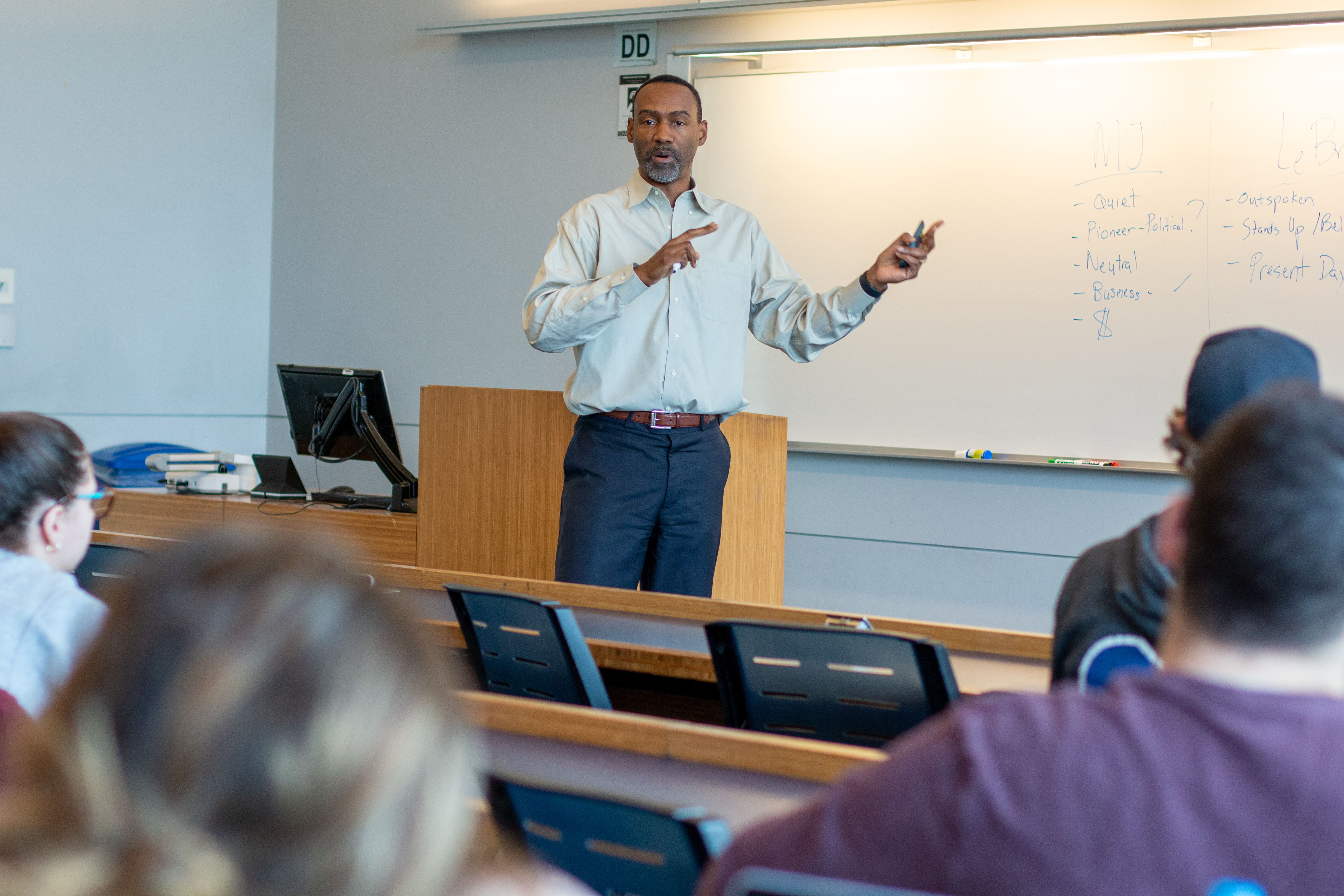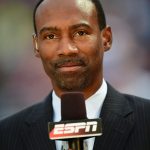If you are a baseball fan, the name Doug Glanville is probably familiar. Glanville, who studied engineering at the University of Pennsylvania, had a nine-year career in the major leagues, including a five-year stint with the Philadelphia Phillies. He was second in the National League in hits in 1999 for the Phillies and hit a game-winning triple for the Chicago Cubs in game three of the 2003 National League Championship Series.
Since his retirement from the game, he has become a television broadcaster, is involved in various businesses, and has been a contributor to The New York Times.
But UConn students may know him in an additional capacity: Glanville became an adjunct professor in the Neag School of Education in the fall of 2019. This spring he is teaching an undergraduate course, Sports and Society, and serves as an advisor for several students.
UConn Today caught up with Glanville in his office in Storrs recently.
What led you to becoming a teacher after your baseball career?
I had been living in Connecticut for my work at ESPN, but after a giant wave of layoffs there which I was part of, I started to think of some other things I wanted to do and tried to look at the glass half-full. I wrote down a lot of ideas. I wanted to talk more about the convergence of sports and society. I came up with various subjects, and leaned on my experience as someone in the media. I came up with an idea about a class that revolved around sports, social justice, and communications.
I talked to a lot of people and I kicked it around with a lot of friends I knew in academia, and it became this living and breathing document that I kept adding to, changing and adjusting after every meeting.
I love teaching. My mother (Mattie) taught many years in my school system of Teaneck, (N.J.), and my dad (Cecil), who passed 17 years ago, also taught in Trinidad and Tobago before becoming a doctor.
You taught at a few schools before coming to UConn, what led you to Storrs?
I had been talking to Dr. (Jennifer) McGarry (department head of educational leadership) for several years. As I continued to stay in touch with her, I thought UConn made sense. There is an incredible athletics program, a large student body and there is a certain sensibility at a state school. There is also a formalized program inside the Neag School of Education that revolves around sports management. There is a real team infrastructure here and a real sense of belonging among my colleagues.
What is the basic premise of your class at UConn?
One of the things I express at the beginning of the course is how sports unites us and bring us together. The fact that you can both be Eagles fans, both be Patriots fans, but may have completely different political views is an opportunity. We are all learning in the class and we are all going to do and say things wrong. We make mistakes, but we want to engage and express ideas and learn through historic context. Current events are the gift that keep on giving. I might go into a class with a power point, but then I play all 28 minutes of the Houston Astros apology, and the students tell me what happened.
It’s a writing-intensive class. I love writing so that is a good fit and there is a ton of reading. The reading is a lot of opinion, because I believe the way to get through the noise is to figure out how to constructively engage. I make sure my curriculum has tons of different points of view and represents all people. I really try to go granular and make that sure I am capturing conservative viewpoints, liberal viewpoints, and make sure I have enough women that are writing and expressing.
Sports is the centerpiece of the class and it’s important to challenge each other.
How does the semester progress?
The first section is about the history of activism – athletes engaging on challenges of social importance. Then, we look at the tools that they use to be engaged and why do people care the issues they care about and protest. That is when we get into the legal context and a discussion about law, primarily the first and 14th amendments, which is due process and is very relevant in college sports, for example. So we engage around the arguments and the political arena.
Of course, you have to know what the issues are, so whether it’s policing, MeToo, or Black Lives Matter, we try to touch on how sports plays a role.
In what way does sports bring people together?
Sports create this opportunity to learn about different kinds of people who are working towards one goal. You are a team and you are trying to beat this other team. You are trying to win and you can come from wherever, but so often some of these difference can melt away because you have this goal. Sport, fundamentally, is housed in some sort of equity because you have rules. You have rules of engagement. You don’t have one team shooting at a basketball hoop that’s the size of the Atlantic Ocean and one on a postage stamp. You have equity and there is a constant effort to make the game fair and have fair play. I am not saying people don’t abuse it, but there is a general understanding that this game does not exist or have integrity or credibility if you don’t have semblance of fairness.
In the class, we talk about teamwork, how it can actually celebrate ways that we have in common and that doesn’t mean you have to agree with everything 100% off the field. It’s a way to think about what you are aspiring to do and accomplish. Every year when you go to Spring Training there are new people and you go in with all these preconceived notions. This guy is from the Dominican Republic, this guy is a Southerner. And then all of a sudden, something magical happens. You pick up a ball, you pick up a bat and you have the same rules that you are all following and all of a sudden you decide, “Wait a minute, who is the guy I want to give the ball to in the ninth inning? Who is the guy I want to set up for isolation for the three-point win?” You are thinking about how we can win this game together as a team and, all of a sudden, you are not concerned about who somebody voted for.
Now for a little fun. We know you are back at ESPN and also with the Marquee Sports Network in Chicago doing Cubs games. Once the season finally gets started, what do you think Yankees, Red Sox, and Mets fans can look forward to?
The Red Sox have lost a lot, and not having Mookie Betts is devastating, but I understand the business sensibility of it. Maybe they would not have been able to re-sign him, but he is a huge loss. They have challenges with pitching, and there are a lot of question marks about who is going to fill voids offensively.
The Yankees are really good. They have injuries that are big questions marks, but they have incredible depth. They present many problems for teams.
The Mets have a new manager and a lot of uncertainties. They always have arms, but just have to figure out how to finish the marathon. They are banged up at the end. They can compete, they just have to figure out how to do it.
They are three very competitive teams. The Yankees are on the one of the group that has the best chance to win it all.





